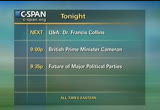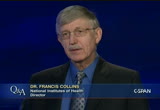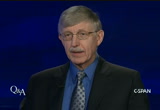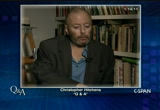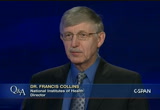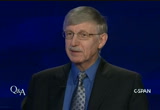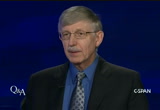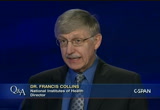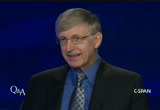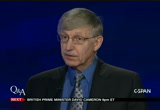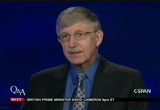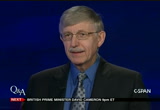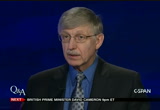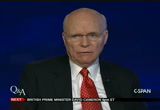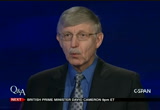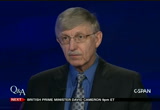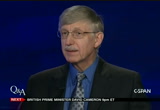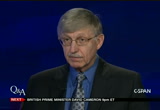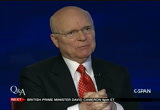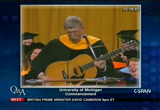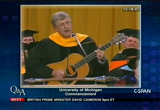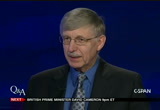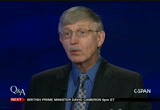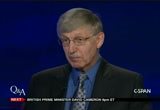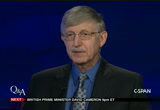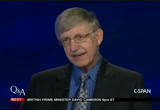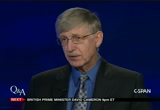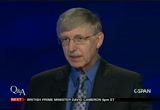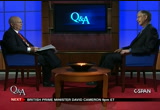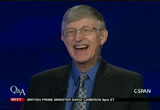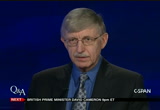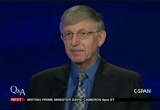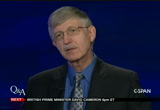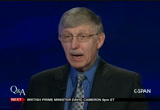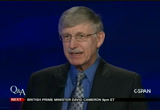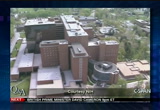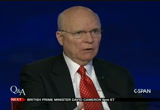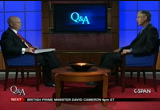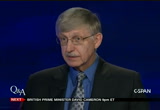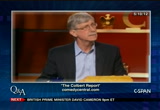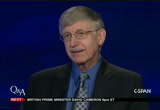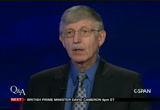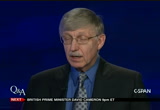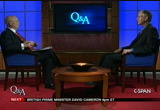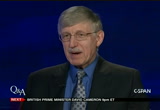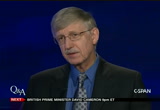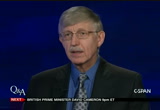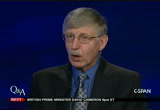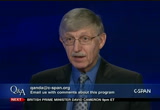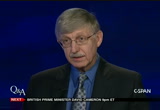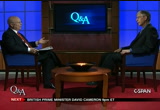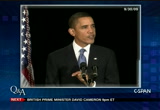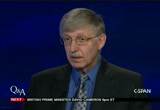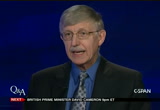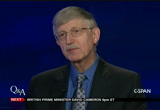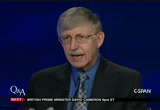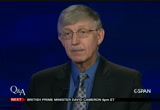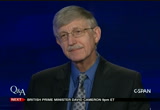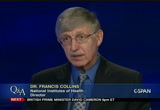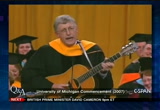tv Q A CSPAN March 24, 2013 8:00pm-9:00pm EDT
8:00 pm
8:01 pm
half of that goes out to grants in every state of the nation. when you hear about a breakthrough that has happened in diabetes research or autism or alzheimer's, it is very likely that it came from a university or institute somewhere that was supported by nih. that is what we do. we support the best and brightest to chase after their visionary ideas, and we think we are good at that. >> what is the influence? how do you influence what goes on? >> it is a very big place. it has 27 institutes and centers. they are various diseases- or focused.tance each of these is led by remarkable, world-class scientists. they work across the landscape to try to identify what has to
8:02 pm
happen next in order to advance human health. my role as nih director is to look across the entire landscape and particularly to identify things that may not be specific to one disease or organ system but could benefit everything, new ways of doing science. since i came out of the genoa genome project, always looking for examples like that. that is a great and wonderful, exciting thing to be able to do, to be able to try to steer this massive ship in a direction that will have the greatest public benefit in the shortest time. >> two years ago, i did interview with christopher hitchens. it may have been close to his last. he died later. i want to run this clip. [video clip] collins, who did the
8:03 pm
human genome project, and who under budget, we are on opposite sides of the religious debate. we became friends. we became friendly debaters, and he has taken a very kindly interest in my case and has helped me have my genome sequenced to look for a more perfect, identifiable match for a mutation that is peculiar to me. >> how did you become friends? >> as christopher said, we started out as debating about the topic of science and faith. are these world views compatible? for me, they are. as a believer, the opportunity to do science and see god's hands in nature is a wonderful,
8:04 pm
positive experience. christopher, obviously, has taken a different view and has been articulate in his argument, thee begin with circumstance of having an intellectual jousting about this, and he is a very impressive debater and intellect, but over the course of time, we became friends. i have great respect for the way he could amass arguments and facts, and then he developed cancer, and i reached out to dim, hearing that, to see if there was anything -- i reached out to him, hearing that, to see if there was anything i could do to help, because he was clearly in a difficult place. having esophageal cancer, which had already spread beyond its original site -- so we met many times in his apartment to talk about philosophical issues, to talk about literature and history, but also to talk about
8:05 pm
medical issues related to his cancer. >> did you ever think that you could really help him? >> i had hoped that we would be able to slow down what was going to clearly be a very threatening an almost certain fatal circumstances, given the far-advanced nature of the disease, and i think we may have slowed it down a bit. his initial diagnosis seemed that he will only have a couple months to live, and he had 1.5 years. he was a pioneer on the leading edge and went to st. louis to have his genome and his cancer sequenced to see if there was something in the cancer cells that would have led to a different selection in cancer therapy, and, in fact, it did. did that result in benefits? hard to be sure. this isn =1 science -- this is science.
8:06 pm
it was an experience. he and i went together to see what we could do in his particular case, and he wrote about it in his columns into "vanity fair" magazine and then the book. "vanitys columns in fair" magazine and then in the book. it is an amazing time right now. >> i know you were running the human genome project. what does that mean? what does "genome" mean? of anis all of the dna organism. that is the hereditary material that gets passed from parent to child that carries all of the hereditary information. it was figured out back in 1953 to be a double helix. it carries that information in a remarkably elegant and
8:07 pm
deceptively simple way with just is.r chemical bas it is a book written in a funny language with just four alphabets in its language. we abbreviate them. t.c, g, and many people think we should have and d. them a, b, c, and all other organisms use that same language, that same concept of the genome. this is over hundreds of millions of years to result in the enormous diversity of species around us. >> heredity, how important is that? >> heredity is enormously important from almost every perspective. certainly, we are all interested in it, aren't we? the characteristics we see in
8:08 pm
ourselves. for me, as a physician, heredity is hugely important. almost every condition is a mix of nature and nurture. the nature park is heredity. if we are talking about cancer or alzheimer's disease or diabetes, heredity is the strongest known risk factor for all of those conditions. that is operated on by the environment and health choices. revealing a lot of its secrets to us, is helping us to nail down what that heredity looks like and how we may learn enough about it to influence outcomes, so if you are born with a high risk of alzheimer's, maybe there is something you can do about it before you get the disease. >> what did he do in st. louis? >> he was examined by the cancer experts. they conducted dna analysis from his blood, and that could tell born with, he was
8:09 pm
and then they could look at the specific dna in the cancer cells. cancer comes about because of bornkes in the dna you are with, causing them to grow when they should not, and in his cancer genome, they found a dozen or some mistakes that were acquired during life that were driving those cells to grow, and at least one of those not previously described suggested the possibility of using a therapy you would not normally have contemplated for esophageal cancer, so there was a chance to try something that was rational, sort of evidence-based, a designer drug based upon the detail. this is where cancer is going. the idea that cancer is going -- the goal that many of us have
8:10 pm
is to get to the point where everyone has that detailed information. you can then look at a menu of therapies and to the match. for this person, this drug is likely to be beneficial, this one probably not, and then we would move from our current approach to cancer, which is pretty much a generic, one size fits all, do something personalized or precision bass, where it really is -- to something personalized or where it really, is. he was during a debate with a famous theologian. i went to listen to the debate and went to dinner afterwards, and we got into a fairly intense argument about whether or not the concept of right or wrong has any meaning. if you do not accept the idea that there is something greater than us behind all of this.
8:11 pm
>> so when did you get involved in this cancer program? >> shortly after he was diagnosed, what would -- which would be about two years ago. >> did he ever say how much it cost him to get from diagnosis to the end? >> i do not know. he enrolled as a clinical participant in a trial. we had no specific treatment for christopher, but if he was interested in a trial and wanted to sign up, he was able to do so. >> what does that mean? >> an important question. lots of people are facing situations where we do not have great answers, where it is cancer or diabetes or alzheimer's disease, and we at nih run hundreds, in fact, thousands of clinical trials where we are testing out some new, experimental therapy. you do not know if it is going to work. the only way to do this is to do this in a careful, rigorously
8:12 pm
observed fashion. trials.gov, nical where people can go to see what they have. what are the conditions that you have to match in order to be enrolled in the trial, and if they want, they can sign up. they go through a process of informed consent so they know what the benefits and risks are, and they decide whether to participate. betweena partnership patients willing to roll and investigators to have new ideas andwilling to enroll investigators that have new ideas. closely with the cdc. we are parallel. we are sister agencies within health and human services, but we work closely with them. >> these are the 2011 statistics on the screen, and it shows the number of people who died in the
8:13 pm
united states, at 2.4 million, and the life expectancy is now 78.7, and the infant mortality is now 6.15 births per 1000, but this is what i wanted to show. cancer, 574,000. stroke, 129,000. accidents, 120,000. 83,000.r's disease, and then, suicide, 38,000. on heart and cancer, have they not been there forever? >> actually, no. those numbers are too high, but heart disease, we have seen death by heart attacks drop by 60%. those numbers would be greater. why is that? i will take some pride in saying that an ice age, by surprising -- supporting research, he going back to massachusetts 60 years
8:14 pm
i will take some pride in by supportingh, research going back to massachusetts 60 years ago, there were many dilemmas, including statins, and a variety thereer interventions -- were many outcomes, including statins. we have ideas about how to go further. cancer, certainly, way too many die from this disease, but the death rate has been dropping about 1% each year for the last 15 years. we are on the right part of the curve, but we want it to go down faster, and these new developments, particularly with we could move -- into a new space that is designer that could be more
8:15 pm
effective. >> how much of it is diagnostic, instruments and the ability to see the disease before it develops, and how much of it is madison? >> it is all of those, and we need to have three things. we need better prevention to keep people from getting cancer in the first place, and we have to work harder to come up with research to encourage people not to smoke, or if they started smoking, to stop. that is the single most actionable cause of cancer, and we still have not succeeded. many still smokes cigarettes, and that is putting them at enormous risk. got christopher esophageal cancer? >> it is hard to say. he was a heavy drinker and a heavy smoker, both factors, but his father had esophageal cancer, so heredity, as well. it is the old statement that genes load the gun.
8:16 pm
friend who smokes, and i chide him about smoking, and just yesterday, he sent me a link to a woman who has smoked and is 100 years old, as if he is saying, "i can live to be 100." know that smoking will definitely cause cancer? >> that is absolutely incontrovertibly proven without a shadow of a doubt. the fact that people are denying that really means they have not looked at the data. the data leads to that conclusion. there are recent papers in "the new england journal of medicine." it talks about cancer, heart disease. someone who smokes lifelong on the average has lost 10 years of life, 10 years. >> every single one? >> this is an epidemiological
8:17 pm
statement. stop, you get most of it back. if you stop at age 40, you get eight years of those back. people listening, if you have gone through your whole life like that, there is a lot of opportunity to turn this around. you have to figure out how to take advantage of the many ways that are now available to help you stop. those. many of you can go to our website and read about programs that are proven to be successful. some things are tough. nicotine is addictive. these are not just people not showing any willpower. it is really hard once you have been a long-term smoker. dayy mom smoked one pack a and then quit and then got lung cancer, and she said to me, "i did not get lung cancer because because i smoked,
8:18 pm
because i quit." or 10likely started six years earlier, -- it likely started six or 10 years earlier, but it takes that long to lead to enough of a mask to detect it, so i am sure that it started before that -- to lead to enough to detectives, so i am sure it started -- to detect it, started a couple years earlier. >> let's look back. [video clip] this is a song that probably after today, you will never again want to hear it. this is a rush, play and my guitar at chrysler a arena. -- chrysler arena.
8:19 pm
[laughter] whoa. someone, lock the doors. this is an experience, except for the last sentence, which is for me as a genetics professor. so here we go. ♪ ♪ i came i bought the books lived in the dorms followed directions made lotsudy hard, of friends who had connections -- i worked, studied hard in a fairsay, not way than this, ih more did it their way ♪
8:20 pm
[applause] now why did you do that? >> oh, goodness. i grew up in a musical family, and music has always been for me a break from the seriousness of life, whether it is a joyful song or a silly song. it is a way to use another part of your brain and relate to people, and as a medical school professor at the university of michigan, also learned that medical students are not so easy to keep interested, -- i also learned that medical students are not so easy to keep interested. for medical students, when it seems they were reading their newspapers or starting to sleep or maybe not show up for class at all. >> you were horn -- home schooled for how long? years. my mother had a master's degree from yale, which is where she
8:21 pm
met my father. it was unusual for her to be in graduate school at yale in the 1930's. sons,cided that her four and the youngest, would be better served by a per educational methods than by various public schools -- would be better served by her educational methods. i think she was right. she was remarkably gifted in rk.viding that sparked -- spa i learned to love learning because of the way she introduced me to topics. it was very chaotic, i must say. >> what was the day like? >> there was no lesson plan or curriculum standards. my mother would say, ok, what is interesting today, and some days, it would be mathematics, and we might do only mathematics for three days in a row because it was interesting, and then it
8:22 pm
would get tiresome, and she would say, let's talk about history and talk about what the significance of that event was, and she was a playwright and very interested in languages. we did a lot of study of languages, and she would say, "ok, here is a word. do you think that is derived from greek or old french or latin?" and i got pretty good at bats, and we would go to the dictionary and looking it up -- and i got pretty good at that. and we would go to the dictionary and look it up. they bought a farm in the late 1940's and try to live off of the land. that did not work so well, so it is good that he had a day job, so i grew up on a farm, and it was hard work sometimes trying to manage all of the livestock and crops and everything, but it
8:23 pm
was a great way to grow up. >> and your brothers works, schools? -- where homes gold? schooled?me >> yes, all four. at what point did you get interested in chemistry or biology? >> it took a little while. i had a little interest in science, so i was one of those kids glad to have a chemistry set and would try to blow stuff up, which is what most boys do with their chemistry sets, but it was a gambling thing. public time, i went to school. >> stanton, virginia? va., and my mother decided she had done enough
8:24 pm
homeschooling. of lovingfoundation learning, and then for science, i had in this public school in staunton, va., a teacher who taught chemistry, who absolutely inspired me to see what science was about and let me to believe that that is what i wanted to do. -- and led me to believe that is what i wanted to do. inside ansomething item, and we did not know what it was, and he asked us of all of the experiments we could do to try to figure out what was inside that box without opening it, and it was a perfect metaphor of what science was about, and i had never been challenged in that way. i had dabbled in science. buts not so interested, this was use your brain. it is a detective story. iw, that sounds like what
8:25 pm
want to do, so i decided right then and there that i wanted to be a chemist. >> how long were you an atheist, and why? >> i grew up in a home where it was not considered important or relevant, not denigrated, so when i got more interested, majored in chemistry, when to graduate school, study and quantum mechanics, -- went to graduate school, studied quantum i was looking at what was the need for got there, and it was a community -- what was the need for god there. by the time i was a second year grad student, i was an atheist. i did not see any need for god. for those that expressed an interest, i did not even feel it was worth talking about, but then something happens. i changed my scientific direction because i felt i had missed out on the excitement of
8:26 pm
biology. there was ana -- dna study that was coming along. i decided to go to medical school. >> where did you go? >> university of north carolina. >> prior to that, you got a ph.d. at yale, and prior to that? >> undergraduate at the university of virginia. i had been married and had a daughter. this was a lot of things to packed into a few years, and then i had to go to medical chapel but i landed in hill, and i embraced that science immediately as what i had been looking for. and the part of medicine that particularly appealed to me, maybe because of my attraction to mathematics, was dna, the genetics that underlie human biology, so i became attracted to that even as a first-year
8:27 pm
medical student. >> you spoke about a book you had written it. let's listen in on what you had to say. [video clip] is how itnd here works for me. i do believe that god created the universe, that energy that screens out for an explanation about how something can be created out of nothing -- that energy that screams out for an explanation. not just having some rocks and some gas floating around the universe, but the intention to have creatures, including one type of creature with whom he could have a relationship. that would be us. i believe god chose the mechanism of evolution in order to accomplish that goal. >> i looked for the strongest criticism i could find of you on amazon, where they have all of those reviews.
8:28 pm
i want to read the paragraph to you and get you to react, because you got a lot of positives, but you got a lot of negatives too, which i know you are used to. this is not signed. this was back in 2006. "one would hope that it would be immediately obvious to collins that there is nothing about seeing a frozen waterfall, no matter how frozen, that offers the slightest collaboration of the doctrine of christianity, but it was not obvious to him, and it will not be obvious to -- if theis readers, beauty of nature can mean that this is the son of god, then anything can mean anything." so what is it like as a scientist, convert to christianity, and then get slapped around by people on amazon?
8:29 pm
>> let me reflect on what that waterfall comment was all about. >> yes. >> as i said, i went to medical school an atheist and emerged a believer. how did that happen? a lot of it was sitting on the bedside of people losing their lives and realizing i had not thought deeply about it and not looked at the evidence, and i was supposed to be a scientist, making decisions on the basis of evidence, so i began my own search somewhat reluctantly and realized that probably atheism is the least rational of all of the choices, given that it says "i know so much that i can exclude the possibility." and i do not know much about side of nature. given that, atheism is ruled out as a system that a thinking, rational person could adopt.
8:30 pm
can adopt it.ple i am saying it rather strongly. this is a defensible position, but for me, it was kind of a cop out. and what i began to realize is that their arguments, and they have been put forward by people down through the centuries that might lead you to the conclusion that belief is more rational than disbelief. therefore, over a couple of years of wrestling with this and beginning to recognize that the world religions have a lot in common, but there is something very special about christianity and the person of christ, and that is an extremely well documented -- i became somewhat against my own best interests as a scientist a believer. >> have you ever doubted that since? >> oh, sure. every believer have to have doubts. it is an element of belief, doubt, but doubt is a good thing
8:31 pm
because it lets you know what .ou need to dig deeper into >> what impact has it had on you as a scientist in that scientific community that views outwardly acknowledge yourself -- that you outwardly acknowledge yourself to be in? >> a god to whom one may pray. that is not hypothetical. perspective.eist scientists do not talk about that. i have written a book to speak about this because of a desire to particularly help those that are wrestling with the issues to see that there are ways. a comet from that of your about the waterfall i guess is an easy one -- that comment from that
8:32 pm
viewer about the waterfall i guess is an easy one. a creator that has an intelligence and a mind -- it was a moment of having all of the distractions that did in our get in our way stripped away, and that was the conversion. >> where was that? >> in the cascade mountains. >> who were you with? >> i was with a friend. we were on our way to a genetics meeting, and we took time to explore, and it was beautiful. >> did your friend know you were having a conversion moment? >> he had no idea. it was personal. it was not something i was sharing with the guy that was there with me. >> so what did you do when you had that moment? >> i had this very clear sense of personal commitment and a
8:33 pm
realization that i had crossed the bridge into becoming what i had thought i would never become a believer in a personal god. >> was there anything else going on in your life that may have helped you get to this point? >> as a physician, life and death is all around you. this is a really important question. this is not something to put off indefinitely as i may be had planned to do. here, as a scientist, i was looking at all of these interesting things about how nature works and how human biology is wired, but what is a more important question than if there is a god? it seemed like one that needed an answer. >> going back to christopher haveens, where he may changed his mind at the end. >> i made no effort to convert in the end. hitchens i thought that would be
8:34 pm
disrespectful. i was trying to serve as a position to someone who had cancer. it would have been inappropriate to try to use that moment to try to impose my perspective on his. we had interesting jousting back and forth, much of a humorous. >> how close to his death were you able to talk to him? >> i saw him quite a lot until the last three months, when he went to texas to do this proton beam therapy and never got well enough to come back. nih?t's go back to 320 acres in bethesda, md., and on that campus, there are about 17,000 people, amazing people. about 5000 to 6000 of them have doctoral agrees, and they are experts, on almost anything you can think of, from basic science to clinical research.
8:35 pm
we also have on that campus the largest research hospital in the world, 240 beds, and the people in that hospital, are there because they are all part of a clinical trial of some new approach to understand a disease that we do not have a good answer for, but, again, while that is an amazing place, the outs, the vast majority go in grants to the best and brightest investigators in stanford or the university of illinois or massachusetts general hospital or all over the country, where those visionary things are happening, and we are on this remarkable pace right now of accelerating knowledge about how like fireworks -- wife works. s. how life work it is amazing. >> how do you control that money? know that people are not ripping you off?
8:36 pm
there are people who have gotten this money and have not done anything with it? >> our system is rigorous. if you want money from nih, you have to write up a grant proposal, putting forward what you plan to do for the next year's and defending that that would be useful and that it is possible you might actually be able to do it. it is then reviewed by a panel of experts in your field, in the most rigorous, peer review system in the world, and then they look at a whole bunch of grants that have come in that cycle, and they score them and give them a priority. we only fund about one out of six, so if you come with an idea that is not very well baked, you are not going to get dollars. you are in the very best of the best if you get that award. >> can you call up one and say, "i want you to give tom smith the grant"?
8:37 pm
>> absolutely not. that would be totally inappropriate. the way it works, the peer review systems sets the priorities, and then there is where there are senior people who looked at the portfolio of the institute and say, "you know, we have an area that does not have enough going on. this grant does not quite make the cut, but i think we should find it anyway, and we have a big pile up over year -- maybe we should fund it anyway, and we over here."ile-up and if you are deviating in some way or going down some pathway that is inappropriate, you will hear from us. >> which one is the biggest? >> the biggest is the cancer institute. right behind that is the infectious disease institute, which oversees hiv/aids.
8:38 pm
right beyond that is the heart and lung area. blood diseases. not too far down are others like the diabetes institute, the aging institute, the mental health institute, the neurological diseases institute, and then down the line. >> speaking of diabetes, you have a couple of times appeared on the show of stephen colbert. this is from a couple years ago. [video clip] i was 30years ago, pounds fatter. >> you are superfast. i wanted to say something about that -- you are super fat. [laughter] in diet andange exercise -- can i show you? >> sure. >> this is called fat.
8:39 pm
this is just 5 pounds. i lost six of those. >> that looks delicious. [laughter] that, my first question was if you stacked up six of those, where would you put that on your body? that looks huge? lump.is not one big it is all over you. shocking and impressive. that is why i brought that impressive show and tell. that pointyou go on because you know he often skewers people. go on that,ou because you know we often skewers people? -- he often skewers people? and hee is an audience,
8:40 pm
kind of like to bring scientists on, because he has got an inner chancemself, so it was a to talk about our national epidemic of obesity, which is resulting in an epidemic of diabetes. this came at the time hbo was doing its documentary on diabetes, which we at nih had a part in. colbert bump. >> it does not look like this nation is getting any thinner. >> there is some progress being made. i am particularly interested in some cities, particularly in philadelphia, where mayors have decided this is an opportunity, and we have to look at it as a community issue and not just
8:41 pm
blame the individuals who are struggling with their weight, and that means providing safe places for people to exercise, bike lanes, thinking about the food deserts', better efforts in school lunches -- thinking about the food deserts. all of these things in many ways our community issues. we cannot solve our obesity issue with any single thing. we cannot do it simply by educating people about what they should eat or national policies. >> why is this such a heavy nation? >> it is a combination of things. it has been growing on us, literally, over the past 30 or so years. some of it is the addiction to screen time rather than outdoor time, which has greatly reduced burning calories. the food has gotten very calorie rich and very cheap. inre are some things we put
8:42 pm
our mouths that are empty things., sugary this is a big issue that has grown over time. >> what do you think about what the mayor of new york has been doing? >> to see what is it possible with government policies to try to encourage public-health changes that are going to be better for our nation and save us in terms of health-care costs. he gets accused. but if we are serious, if obesity is threatening to make this the first generation where our kids do not live as long as we do, it seems like there is a responsibility. >> how tall are you? >> 6 feet, four inches. i was 213 pounds. >> are you still 30 pounds less? >> yes. >> where did you lose it?
8:43 pm
>> i was a junk food addict. honeybunch, pastry. that was something i could not pass up. >> for how long? >> most of my adult life, and it crept up on me. and weine dna analyzed, are analyzing and discovering the hereditary part. it turned out my results suggested i was at a higher than average risk for diabetes, and that was part of the wake-up call that made me finally decide to take charge. >> who can have their dna tested? >> there are companies on the internet. you have to be very careful looking at what they are offering and what their truth in advertising is, but you can have your dna analyzed for a couple hundred dollars and look at what your risks are and what you might want to do about it. >> the best? >> you can read my book, and you can also look at their materials
8:44 pm
and assess which of them seem to be giving you scientific evidence, what are their citations, why do they point to as far as the basis on which they make these recommendations, but i do not want to promote this too much because this is still early days. it can change your odds a little bit up or down, but they are not telling all story. there is a lot there. >> what did you learn about your medical -- >> i was worried about the alzheimer's diseases. that is where we have a pretty impressive ability to make one a gene,based on
8:45 pm
apoe. all of those things could be misleading because we are still scratching the surface of understanding ready. what i can see now is a small fraction of what is there. >> the numbers, you probably have them, but i think from reading, more men get prostate cancer than women get breast cancer. >> that is true. see pink we not ribbons for prostate cancer, and we see all of this attention on breast cancer? almost nothing on prostate cancer. >> there is a bit. the prostate cancer foundation that very much promoted. prostate cancer is generally a disease of older men. prostate cancer also is less frequently leave so, perhaps, as perhaps, it is not seen that.
8:46 pm
but there is a lot of advocacy. it is not always connected in terms of the seriousness of the problem. i mean, if you look at diabetes, diabetes kills a lot of people, from heart attacks, from kidney failure. kills people, but does diabetes have the same visibility as breast cancer? it does not seem to come in part because of the urgency. the advocatestive have been. >> how much money does the national institutes spend on breast cancer and prostate cancer? >> i do not know the numbers, but it is a lot. >> breast cancer more than prostate? >> i bet they are fairly close. also, in terms of how we allocate funds, we are learning about cancer is probably our designation of cancers of the organ in which they arose is not very helpful. what really matters is which
8:47 pm
genes are active. somebody studying breast cancer may make a discovery that is more helpful for prostate cancer than breast. we need to think about it in a different way and not try to parse it out in different organs. you appoint the heads of the national institutes? >> they are appointed by the secretary of health and human services, kathleen sebelius, but i have a very heavy role in making a recommendation, and i do so generally by organizing a search committee of the best and brightest people in that field to try to identify the perfect person, have them go through all of that vetting, and then have them make a recommendation to the secretary. it is not easy. we cannot pay them probably more than a quarter. you can barely squeeze up to $300,000. very few of our directors are at
8:48 pm
that level. they get paid three or four times that. >> why did you depicted to do the human genoa project? >> i have wondered that -- why did you get picked for the human genome project? >> i have wondered that. it started in 1990, and the first person was james watson, of watson and crick. i was at the university of michigan. i had been hunting for genes that cause diseases, including for a disease called neurofibromatosis. but i was not expecting to get a call to come to nih and lead that effort, and i initially
8:49 pm
said no because it did not seem like something i was ready to do. my mother, who i told you earlier was such a wonderful influence on me, she told me that there was one thing i must always avoid, and that was becoming a government employee. you with thatre project? in 1993 and stayed until 2008, but all of the goals project weregenome reached early. it cost less than planned. a $3 billion budget, and we did it for $2.60 billion. a federal project, ahead of schedule, and under budget, not bad. republicans a working for a republican president, and you were picked by her, and then barack obama
8:50 pm
picked you to be the head of nie age. nih. how did that happen? >> medicine, non-partisan. may always be that way. that is something we should value if we care about our health and that of our family and our friends and our constituents. this is not something where republicans and democrats generally differ. the president9, in his brief made this announcement, and then i want to ask you what happened. [video clip] dowe knew the work that you would not get done if left solely to the private sector. some research does not lend itself to a quick profit, and that is why places like the nih were founded, and that is why my administration is for the pursuit of discovery, and that
8:51 pm
is why we are announcing we were awarded $5 billion, that is with a b, in grants through the recovery act to conduct cutting- edge research all across the america. >> assuming you were in the room, what happened to the $5 billion? >> it went to accelerate some very exciting science that otherwise would have taken a lot longer. we have talked about cancer. our ability to know for 20 different cancer types exactly what is the menu of genetic mutations that can cause this cancers, was greatly accelerated by part of that $5 billion. our ability right now to say within the next few years, we may have a vaccine for influenza that works for all of the strains, so you do not have to get your shot every year. if you get your shot, and you were covered. that was greatly accelerated, and hundreds of others that would have taken time were
8:52 pm
stimulated by the recovery act. it came at a great time, because from 2003 until 2008, the budget for medical research at nih was basically flat, which means inflation was eroding it, so their ability to chase after visionary ideas was being diminished. this tapped into a great, pent up opportunity to do visionaries' science, and it happens. >> who made the decision on where that money would go? >> across all 27 institute, a team, working together, at remarkable speed, because this all came together quickly -- across all 27 institutes. i would defend every penny. >> how fast did you get the money out there? >> we did it in record time. i think we knew in february that the money was coming, and then had to be couched in terms of new projects, and applicants had
8:53 pm
to write grants, and they had to be reviewed, and most of the --nts or out of the door were out of the door before the year and. -- the end of the year. >> connecting the neural dots. on atting the nation course to map the active human brain, president obama may have picked a challenge more daunting than afghanistan or finding common ground with his republican opponents. as we record this, it has not been announced, but i did not see your name in this story. are you involved? >> oh, very much so. this is an exciting opportunity. this is right on the edge of what is possible, which is what nih should be about.
8:54 pm
we have the ability to understand the brain in certain ways, but there are many areas where we do not have a clue about the way it works. for instance, we can record individual brain cell, a neuron, we can see the whole thing, but there is this enormous gap in between about how the circuits in the brain function in order to be able to move my hand or to be able to look at you and process that information, or to lay down a memory. we do not know how that works. with technology, yet to be invented, so a lot of this is going to be nanotechnology, what we need to do is be able to record may be hundreds of thousands of brain cells at the maybe ime -- record hundreds of thousands of brain cells at the same time. we do not have a time frame, but
8:55 pm
it is getting to be a very exciting moment to put something together that we could not have thought of. >> the article says it is going to be hard to do that than the human genome project. >> i agree. we were done. it is hard top, say when you would complete the effort because the brain is enormously complicated. thetrillion cells, all of ways they interact with each other. we will never be able to say, "we got it." what are we talking about with the activity map, not that we will reveal all of the secrets, but that we will reveal some of them in an ordered away and that nails down some of those goals -- >> when will it start, and how much will it cost?
8:56 pm
>> still to be discussed. we hope to start at least some pilot efforts in the next year. i cannot give you a cost at all until we have a chance to lay out what the plan will be. >> how long? >> i am having fun. the budgetary issues makes it less fun than if we were in a youngg phase, and i see scientists looking at the situation and wondering if they can stick it out through thick and thin, because there is a lot of thin right now. i am also supported by the president. i am therefore the second term. traditionally, the director of nih turns over. i would assume i have a little less than four years to go. >> for you, the most exciting possible discovery that you are aware of coming along in your work? >> it is very hard to pick one.
8:57 pm
i do think what is happening in cancer right now because of the secrets that are being revealed from the tools that basically came out of the human genome project -- i did not think in my lifetime we would learn, and with direct implications to figure out how to prevent and treat this disease -- in medicalste money research? >> if there is waste there, i have not found it. certainly right now, we are only funding one out of six ideas that come to us. we waste ideas because we do not have the resources to support them. if somebody thinks that somehow medical research is rolling in the dough and we can cut back on it without consequences, , and spend a day with me and listen to what people are saying -- come and spend a day with me. there are graduate students wondering if they should continue down a course when they
8:58 pm
see their mentors struggling. i do not see waste here. i see a lost opportunity. >> going back to that graduation class at the university of michigan, and i want to thank you for joining us today, dr. atncis collins, the head man the national institutes of health, but here you are in a different setting, and thank you for joining us. >> it has been great being here. ♪ [laughter] fine, youngy friends, now that i am a full professor where once i was oakcrest, i have now become the -- where once i was oppressed, i have now become the cruel oppressor
8:59 pm
and maybe you will see the double helix as a highway and do it best and do it my way ♪ [applause] well, i am just a man, what can i do? open your books, read chapter two and if it seems a bit routine, do not talk to me, go see the dean victorsot fail, to the ♪il, and go do it your way [cheers and applause] ♪ [captioning performed by national captioning institute] [captions copyright national cable satellite corp. 2013]
83 Views
IN COLLECTIONS
CSPAN Television Archive
Television Archive  Television Archive News Search Service
Television Archive News Search Service 
Uploaded by TV Archive on

 Live Music Archive
Live Music Archive Librivox Free Audio
Librivox Free Audio Metropolitan Museum
Metropolitan Museum Cleveland Museum of Art
Cleveland Museum of Art Internet Arcade
Internet Arcade Console Living Room
Console Living Room Books to Borrow
Books to Borrow Open Library
Open Library TV News
TV News Understanding 9/11
Understanding 9/11